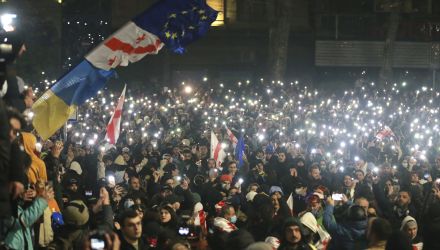Published in "Revisions"
Introduction
The North Atlantic Treaty Organization (NATO) is considered the most successful military alliance in history, and yet, its future is clouded in uncertainty. With the end of the Cold War, followed by the breakup of the Soviet Union, NATO has suffered from a structural problem that has become more acute over time—the absence of a clearly defined existential threat to Europe. This makes for a dubious raison d’être. If NATO’s future was ambiguous immediately following the Cold War, it is disquieting to consider its role in an environment of draconian defense cuts, fiscal woes in the United States, a Europe-wide financial crisis, and a U.S. military shift toward the Pacific.
Yet NATO is not going to disappear anytime soon, no matter how bleak the prospects for its existence might appear. First, European security, though lacking a clear antagonist, is still important; second, NATO has evolved from an organization dedicated to collective defense into an institution “complete with transnational command structures, a permanent bureaucracy, buildings, regular meetings and ceremonies, its own logo, website and so on.”1 Like any bureaucracy, NATO has a self-preservation instinct and seeks to maintain autonomy, prestige, and influence. Secretary-General Anders Fogh Rasmussen’s Smart Defense initiative, unveiled at the 2011 Munich Security Conference, aims to keep NATO’s influence intact as the cash-strapped United States draws down its military presence in Europe.2 Smart Defense intends to pool military resources and encourage European member states to specialize in areas where they display a competitive advantage.
While certainly no panacea, Smart Defense must be encouraged. This initiative will not solve the Alliance’s structural problems, but it can incentivize European member states to take on significant responsibility for their own security and that of the European periphery in light of U.S. retrenchment. Some European nations are heeding the call, although it remains unclear whether their behavior will influence other countries. NATO will remain relevant if member states increase defense spending, or, at minimum, begin trying to do more with less.
For full text see: http://bcjournal.org/storage/BCJ-2013edition.pdf
Sandole, Timothy. “Nebulous NATO: A Quest for Relevance.” Bologna Center Journal of International Affairs, Spring 2013




